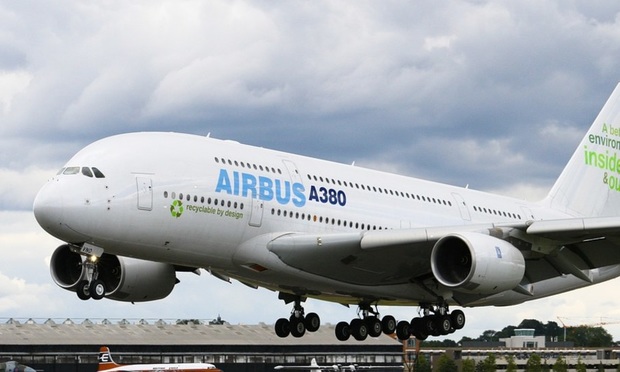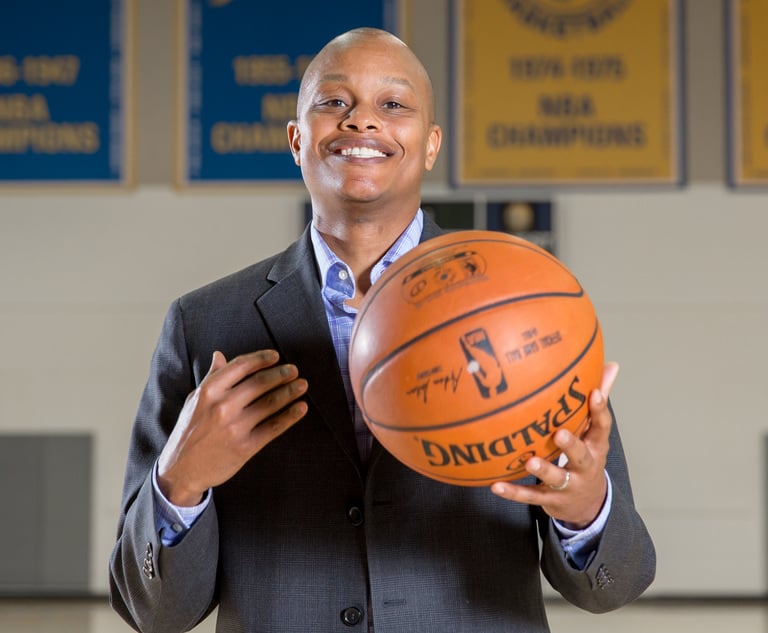How Airbus Landed its Record Settlement
The €3.6 billion ($4 billion) settlement closed a long-running, multijurisdiction investigation into alleged corruption and bribery by the aircraft maker.
February 04, 2020 at 02:55 PM
4 minute read
The original version of this story was published on Law.com International
 Airbus agreed to pay a total of €3.6 billion to bring investigations into alleged bribery and corruption to a close.
Airbus agreed to pay a total of €3.6 billion to bring investigations into alleged bribery and corruption to a close.
The coordinated settlement agreement that lifted a legal cloud over Airbus was the product of an extraordinary, multiyear collaboration among five top-tier law firms in three countries, working closely with Airbus and national authorities in a "virtual law firm" whose size and scope was unprecedented, according to lawyers involved.
Airbus will pay a total of €3.6 billion ($4 billion) to authorities in France, the U.K. and the United States to settle a four-year-long investigation into accusations that the aerospace giant, based in Toulouse, France, arranged bribes to sell its products between 2004 and 2016 in violation of International Traffic in Arms Regulations.
The settlement agreement, which spares Airbus criminal charges, was announced Jan. 31 by the French Parquet National Financier, the U.K. Serious Fraud Office, the U.S. Department of Justice and the U.S. Department of State.
Though the financial penalties are among the largest ever assessed on a corporation, the fact that Airbus itself invited the investigation was a mitigating factor, lawyers said.
The five firms representing Airbus in the settlement negotiations—Clifford Chance and August Debouzy in France, Dechert in the U.K., and Paul Hastings and Arnold & Porter Kaye Scholer in the U.S.—were brought together by Airbus' general counsel, John Harrison, whose in-house legal department effectively became the sixth player on the team.
The firms, all with leading white-collar defense practices, were chosen in part for their longstanding relationships with national enforcement bodies—though not necessarily with each other. Harrison, who devised the tactic of creating the virtual law firm, deserves credit for pulling it together and keeping it together, lawyers said.
"John Harrison breathed life into this Frankenstein," said Robert Luskin, a partner in the investigations and white-collar defense practice at Paul Hastings in Washington. "He picked individuals he knew and trusted implicitly to work together. It was astonishing—what a great matchmaker he was."
"The level of openness was quite extraordinary," said Gilles August, partner and co-founder of August Debouzy. "There were at least 100 lawyers exchanging information freely every day, and the partners met every week to two weeks. It was as though we were all working for the same firm."
While multijurisdictional deals involving multiple firms are not unusual, especially in white-collar and trade matters, the Airbus settlement stands out for the sheer volume of challenges, including differences in national security laws, language, data protection regimes and national blocking statutes—all of which needed to be resolved to achieve Airbus' goal of announcing a coordinated settlement on a single date.
"The national enforcement systems are roughly similar, but they do not fit together seamlessly," Luskin said. "France, for example, does not recognize privilege for in-house counsel. So what do you do about documents given to the PNF [in France], which might be considered a waiver in another jurisdiction?"
Calculating the financial penalties was also a challenge, August said, to make sure that "we agreed on a methodology that was consistent and also acceptable to Airbus."
Relying on digital tools such as eDiscovery to organize data and documents was indispensable, lawyers said, helping them tackle other challenges like persuading their government counterparts to share with allies who were also adversaries, especially in trade matters. "In the beginning, you'd sit down with a regulator who'd say, 'Don't tell the others this,' and we'd roll our eyes and say, 'Our direction is to be transparent and cooperative—don't put us in the middle,'" he said.
In the end, Luskin added, officials displayed a "laudable" willingness to compromise: "When there were genuine collisions, everybody found room to give. This settlement could not have happened without that."
As part of the settlement, Airbus agrees to "light compliance monitoring" for the next three years by the Agence Française Anticorruption, or AFA. Otherwise, the company "can now serenely look to its economic future," the French prosecutor, Jean-François Bohnert, said in announcing the deal. What that future looks like will depend in part on what happens to Boeing, the other player in the global aerospace duopoly, which faces regulatory and business challenges of its own.
For now, the Airbus settlement "is an opportunity, for our client and for the industry," August said. "Members need to function with the highest ethical standards. This can provide a template."
This content has been archived. It is available through our partners, LexisNexis® and Bloomberg Law.
To view this content, please continue to their sites.
Not a Lexis Subscriber?
Subscribe Now
Not a Bloomberg Law Subscriber?
Subscribe Now
NOT FOR REPRINT
© 2025 ALM Global, LLC, All Rights Reserved. Request academic re-use from www.copyright.com. All other uses, submit a request to [email protected]. For more information visit Asset & Logo Licensing.
You Might Like
View All
NBA Players Association Finds Its New GC in Warriors Front Office



Law Firms Mentioned
Trending Stories
- 1States Accuse Trump of Thwarting Court's Funding Restoration Order
- 2Microsoft Becomes Latest Tech Company to Face Claims of Stealing Marketing Commissions From Influencers
- 3Coral Gables Attorney Busted for Stalking Lawyer
- 4Trump's DOJ Delays Releasing Jan. 6 FBI Agents List Under Consent Order
- 5Securities Report Says That 2024 Settlements Passed a Total of $5.2B
Who Got The Work
J. Brugh Lower of Gibbons has entered an appearance for industrial equipment supplier Devco Corporation in a pending trademark infringement lawsuit. The suit, accusing the defendant of selling knock-off Graco products, was filed Dec. 18 in New Jersey District Court by Rivkin Radler on behalf of Graco Inc. and Graco Minnesota. The case, assigned to U.S. District Judge Zahid N. Quraishi, is 3:24-cv-11294, Graco Inc. et al v. Devco Corporation.
Who Got The Work
Rebecca Maller-Stein and Kent A. Yalowitz of Arnold & Porter Kaye Scholer have entered their appearances for Hanaco Venture Capital and its executives, Lior Prosor and David Frankel, in a pending securities lawsuit. The action, filed on Dec. 24 in New York Southern District Court by Zell, Aron & Co. on behalf of Goldeneye Advisors, accuses the defendants of negligently and fraudulently managing the plaintiff's $1 million investment. The case, assigned to U.S. District Judge Vernon S. Broderick, is 1:24-cv-09918, Goldeneye Advisors, LLC v. Hanaco Venture Capital, Ltd. et al.
Who Got The Work
Attorneys from A&O Shearman has stepped in as defense counsel for Toronto-Dominion Bank and other defendants in a pending securities class action. The suit, filed Dec. 11 in New York Southern District Court by Bleichmar Fonti & Auld, accuses the defendants of concealing the bank's 'pervasive' deficiencies in regards to its compliance with the Bank Secrecy Act and the quality of its anti-money laundering controls. The case, assigned to U.S. District Judge Arun Subramanian, is 1:24-cv-09445, Gonzalez v. The Toronto-Dominion Bank et al.
Who Got The Work
Crown Castle International, a Pennsylvania company providing shared communications infrastructure, has turned to Luke D. Wolf of Gordon Rees Scully Mansukhani to fend off a pending breach-of-contract lawsuit. The court action, filed Nov. 25 in Michigan Eastern District Court by Hooper Hathaway PC on behalf of The Town Residences LLC, accuses Crown Castle of failing to transfer approximately $30,000 in utility payments from T-Mobile in breach of a roof-top lease and assignment agreement. The case, assigned to U.S. District Judge Susan K. Declercq, is 2:24-cv-13131, The Town Residences LLC v. T-Mobile US, Inc. et al.
Who Got The Work
Wilfred P. Coronato and Daniel M. Schwartz of McCarter & English have stepped in as defense counsel to Electrolux Home Products Inc. in a pending product liability lawsuit. The court action, filed Nov. 26 in New York Eastern District Court by Poulos Lopiccolo PC and Nagel Rice LLP on behalf of David Stern, alleges that the defendant's refrigerators’ drawers and shelving repeatedly break and fall apart within months after purchase. The case, assigned to U.S. District Judge Joan M. Azrack, is 2:24-cv-08204, Stern v. Electrolux Home Products, Inc.
Featured Firms
Law Offices of Gary Martin Hays & Associates, P.C.
(470) 294-1674
Law Offices of Mark E. Salomone
(857) 444-6468
Smith & Hassler
(713) 739-1250






